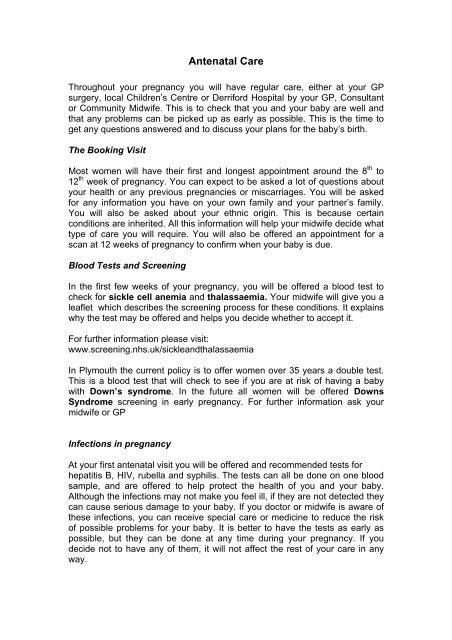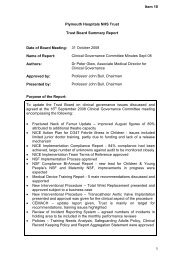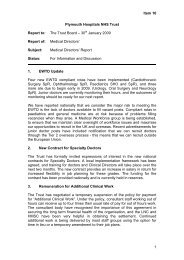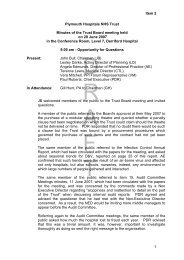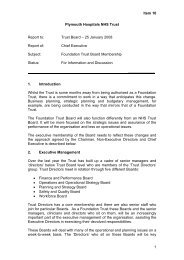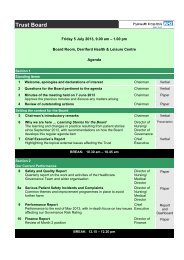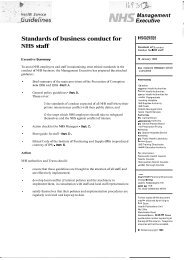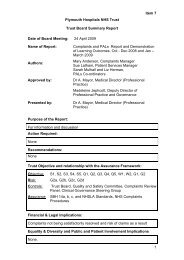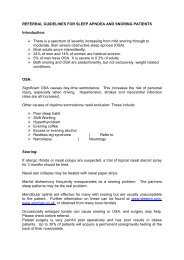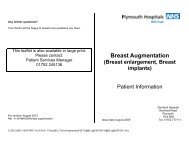Antenatal Care - Plymouth Hospitals
Antenatal Care - Plymouth Hospitals
Antenatal Care - Plymouth Hospitals
You also want an ePaper? Increase the reach of your titles
YUMPU automatically turns print PDFs into web optimized ePapers that Google loves.
<strong>Antenatal</strong> <strong>Care</strong><br />
Throughout your pregnancy you will have regular care, either at your GP<br />
surgery, local Children’s Centre or Derriford Hospital by your GP, Consultant<br />
or Community Midwife. This is to check that you and your baby are well and<br />
that any problems can be picked up as early as possible. This is the time to<br />
get any questions answered and to discuss your plans for the baby’s birth.<br />
The Booking Visit<br />
Most women will have their first and longest appointment around the 8 th to<br />
12 th week of pregnancy. You can expect to be asked a lot of questions about<br />
your health or any previous pregnancies or miscarriages. You will be asked<br />
for any information you have on your own family and your partner’s family.<br />
You will also be asked about your ethnic origin. This is because certain<br />
conditions are inherited. All this information will help your midwife decide what<br />
type of care you will require. You will also be offered an appointment for a<br />
scan at 12 weeks of pregnancy to confirm when your baby is due.<br />
Blood Tests and Screening<br />
In the first few weeks of your pregnancy, you will be offered a blood test to<br />
check for sickle cell anemia and thalassaemia. Your midwife will give you a<br />
leaflet which describes the screening process for these conditions. It explains<br />
why the test may be offered and helps you decide whether to accept it.<br />
For further information please visit:<br />
www.screening.nhs.uk/sickleandthalassaemia<br />
In <strong>Plymouth</strong> the current policy is to offer women over 35 years a double test.<br />
This is a blood test that will check to see if you are at risk of having a baby<br />
with Down’s syndrome. In the future all women will be offered Downs<br />
Syndrome screening in early pregnancy. For further information ask your<br />
midwife or GP<br />
Infections in pregnancy<br />
At your first antenatal visit you will be offered and recommended tests for<br />
hepatitis B, HIV, rubella and syphilis. The tests can all be done on one blood<br />
sample, and are offered to help protect the health of you and your baby.<br />
Although the infections may not make you feel ill, if they are not detected they<br />
can cause serious damage to your baby. If you doctor or midwife is aware of<br />
these infections, you can receive special care or medicine to reduce the risk<br />
of possible problems for your baby. It is better to have the tests as early as<br />
possible, but they can be done at any time during your pregnancy. If you<br />
decide not to have any of them, it will not affect the rest of your care in any<br />
way.
Your midwife will tell you how the results of these tests will be given to you. If<br />
a test suggests that you have an infection, a second test will be done to check<br />
the result. Insurance companies are not concerned about you having any of<br />
these tests. It is only if you are actually found to have HIV, syphilis or hepatitis<br />
B infection that future insurance cover might be affected.<br />
Confidentiality<br />
The results of these tests will be dealt with in strict confidence. No information<br />
about you, or your results, will be given to anyone outside the health care<br />
team without your consent and knowledge.<br />
Please read our local leaflet Ante-natal blood test caring for you & your baby.<br />
For further information ask your midwife<br />
Follow on Appointments<br />
Having regular antenatal care is important for your health and the health of<br />
your baby. At your first appointment your Community Midwife will give you<br />
your ‘hand held’ records. Your midwife will ask you to keep these records safe<br />
and take them to every antenatal appointment. Always ask your doctor or<br />
midwife if there is anything in your records that you don’t understand.<br />
You will continue to have regular check ups with your Community Midwife and<br />
GP until your baby is born.<br />
For further information on low risk antenatal care: www.nice.org.uk


